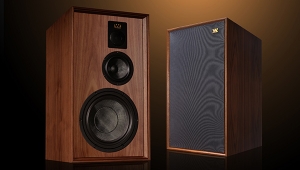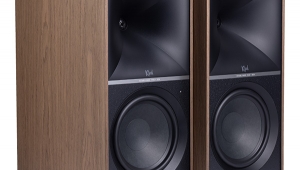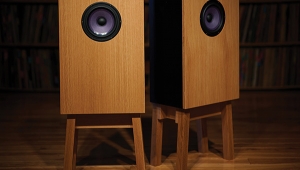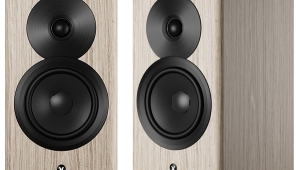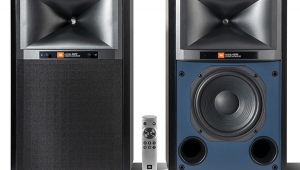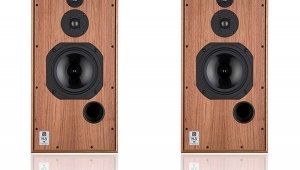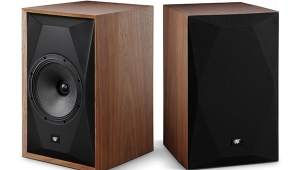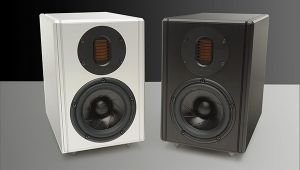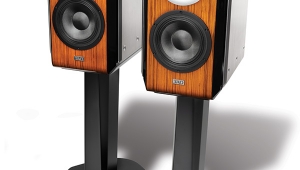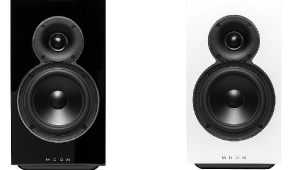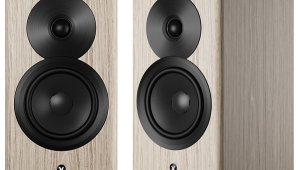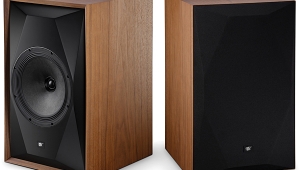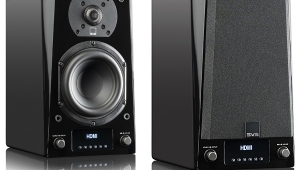| Columns Retired Columns & Blogs |
Revel Performa M20 loudspeaker Page 3
The M20's top treble octaves were as character-free as its midrange, but if I had a criticism to make, it would be of the transition region between the drive-units. Some high piano notes were presented a little more forward in the soundstage, and the overall balance was on the slightly bright side. This was fine with the smooth-balanced Meridian 800 player, but dictated a lower playback level with the somewhat coarser-sounding (in absolute terms) Perpetual Technologies DAC.
Footnote 3: Talk about misleading labeling: This CD is emblazoned as being "96kHz 24-Bit." Yes, that is what the master was recorded at, but the CD is still limited to 16-bit resolution and 44.1kHz sampling, no matter how nicely noise-shaped. And if the original sessions were in 1984, Philips had already changed from analog to 16-bit digital recording by that time.
I experimented with the M20s' HF level controls, finding that the "-0.5dB" setting wasn't quite sufficient to compensate for this presence emphasis but that "-1dB" rolled off the top octaves too much; I did most of my auditioning with the tweeters at "-0.5dB." But even then, when I substituted regular zip cord for the expensive Synergistic Research speaker cables, the balance sounded too forward on recordings that were themselves already on the bright side; for example, Queen's live 1986 concert (Queen Live at Wembley '86, Hollywood HR-61104-2). (I love the music, but what were the engineers thinking!?) But put on a more sensibly balanced recording—the Mobile Fidelity gold CD of Queen's A Night at the Opera (MFSL UDCD 568)—and the Revels' superbly transparent view into the recorded soundstage made even "Bohemian Rhapsody" sound fresh again. (Yes, I could do the Fandango, with speakers like these!)
This magazine's founder, J. Gordon Holt, used to rail against the propensity for high-end designers to suppress their speakers' presence region a little. Yet with small speakers that do not have full bass extension, I have found that such a small "saddle" in the on-axis response actually sounds more natural than a true flat response, as long as it is not carried to such an extreme that the speaker sounds too polite, too self-effacing. When I looked at my measurements accompanying Kal Rubinson's May 2000 review of the floorstanding Performa F30, I was intrigued to note that the bigger speaker did indeed have a slight lack of energy in the presence region, while my measurements of the M20 indicate a truly flat response. An enigma, considering the conventional wisdom that it is the smaller speaker that would most benefit from the slight tailoring.
But to put this criticism into perspective, I'm talking about a very small flaw here, one that goes completely unnoticed on such richly balanced classical orchestral recordings as the recent re-release of Claudio Arrau's 1984 Dresden performances of Beethoven's Piano Concertos 4 and 5 (Philips 289 464 681-2, footnote 3). And oh, the glory of listening through the Revels to this month's "Recording of the Month," Morimur (ECM 1765), from baroque violinist Christoph Poppen and the Hilliard Ensemble. The speakers opened a wide, transparent window into the arrangement for violin and four voices of the immortal J.S. Bach's Chaconne (from his Partita in d, BWV 1004) that sent shivers down my spine. As it should!
Magnifico!
I vastly enjoyed my time with Revel's Performa M20s. Other than the necessarily limited ultimate loudness, they were not out of place in a high-end system comprising much more expensive components. As I found, the speaker's flat in-room balance and lack of congestion will actually be revealing of treble problems in inexpensive front-end components. Of the speakers that I have reviewed in the past couple of years, Dynaudio's Contour 1.3 Mk.II—reviewed in August 2000— is perhaps the closest in terms of its overall attainment and refinement. However, I do not remember the Danish speaker having quite the generous, fullbodied spirit of the Revel.
Partnered with high-quality components and set up in not too large a room, the Performa M20 offers performance that is virtually of Class A caliber at an affordable price.
Footnote 3: Talk about misleading labeling: This CD is emblazoned as being "96kHz 24-Bit." Yes, that is what the master was recorded at, but the CD is still limited to 16-bit resolution and 44.1kHz sampling, no matter how nicely noise-shaped. And if the original sessions were in 1984, Philips had already changed from analog to 16-bit digital recording by that time.
- Log in or register to post comments
